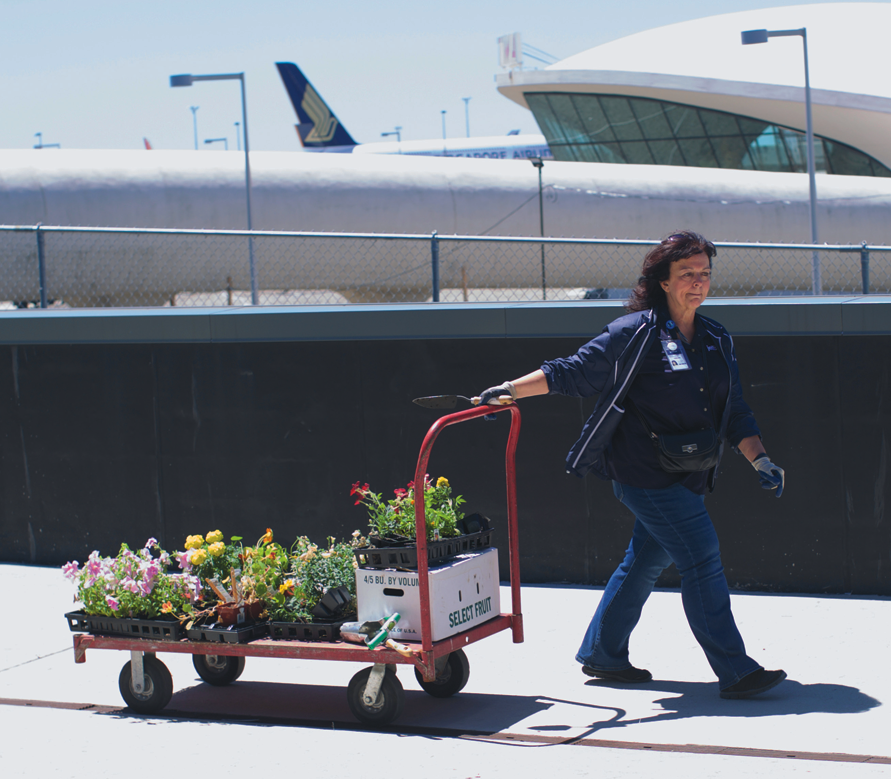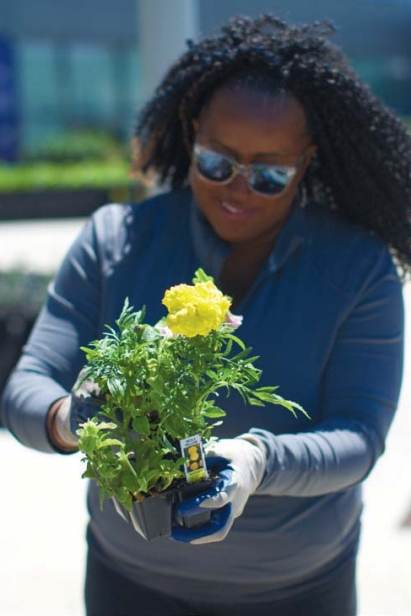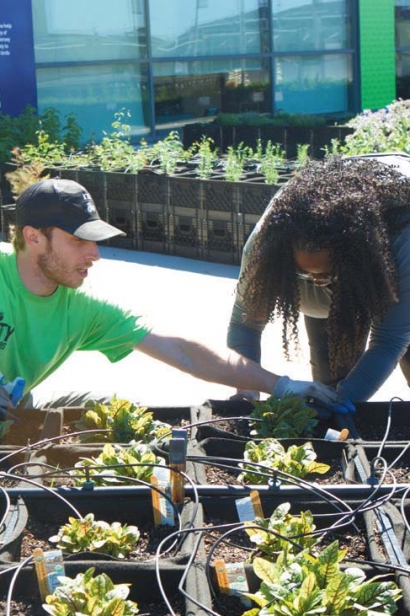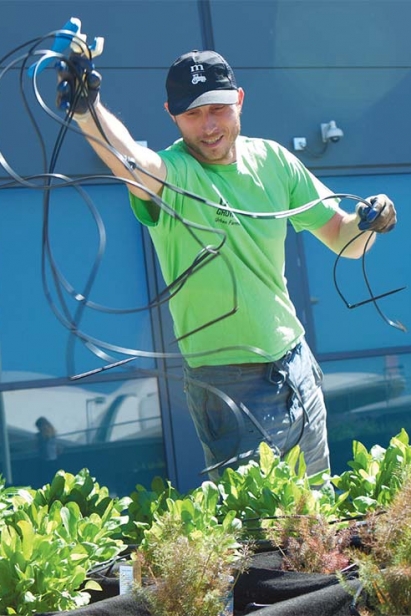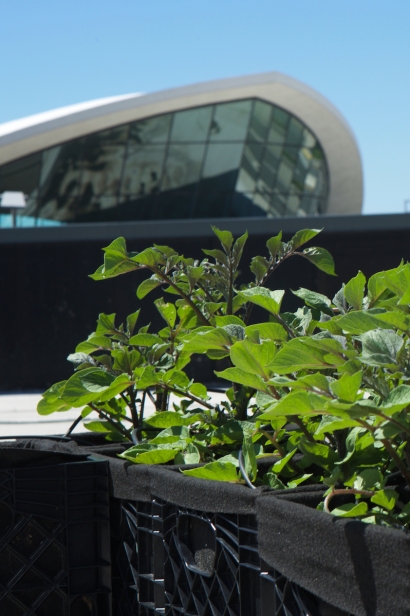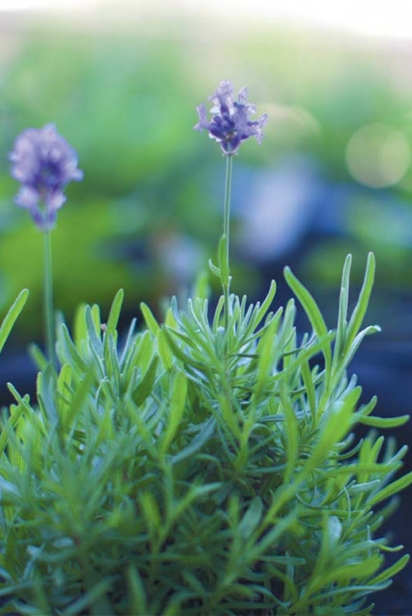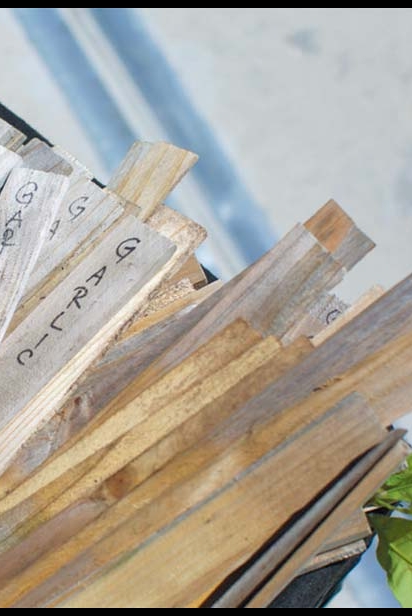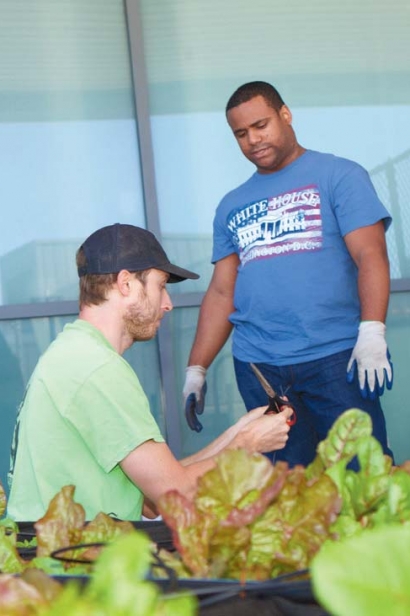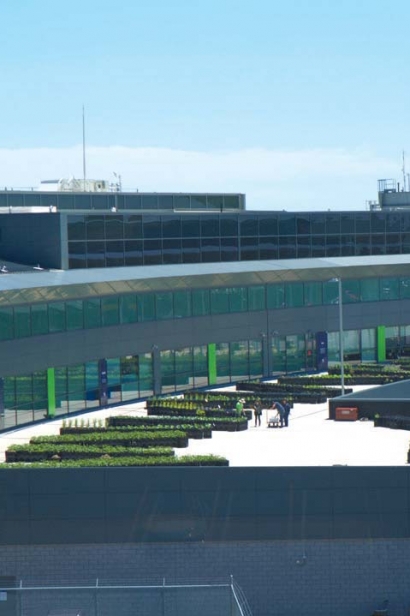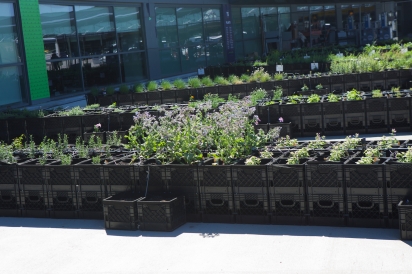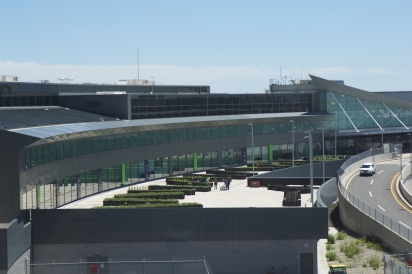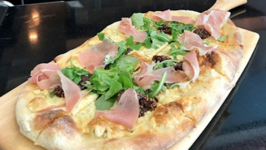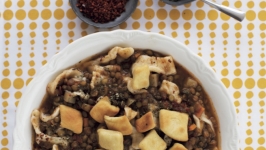JetBlue Puts Down Roots
There’s nothing grayer than an airport on an overcast spring day, and at first glance the JetBlue departures area at JFK’s Terminal 5 is no exception. Looping elevated highways blend seamlessly into drab skies, and the windows of the concrete control towers seem to absorb rather than reflect the clouds.
Across the street, the ’60s-era Eero Saarinen TWA terminal—a mid-century monument to flight whose sleekly curved roof imitates outstretched wings—looms empty. But those travelers who sweep their color-starved eyes toward the ground, through a chain link fence at the far end of departures, will find something strange: Sprouting from milk crates are lacy carrot tops, purple-puffed chives, bending leek fronds.
The combination of jet-age architecture and experimental agriculture seems straight out of the Tomorrowland exhibit at the 1964 World’s Fair, just a hop down the BQE from here—something about how growing food in the future will require nothing but plastic and science. But the reality couldn’t be more 2016: The old TWA terminal will soon turn into a luxury hotel and the lines of reclaimed milk crates contain the early plantings of an organic urban farm.
Before T5 Farm made its leafy debut in fall 2015, the concrete crescent where it now sits was a defunct road, an unused 24,000-squarefoot expanse that Sophia Leonora Mendelsohn, JetBlue’s head of sustainability, couldn’t stop looking at.
“You can’t waste space in New York City,” Mendelsohn insists, explaining what led her to the idea of filling it with over 100 varieties of herbs and vegetables. In the past, Mendelsohn worked on remote carbon-offsetting initiatives like capturing methane and protecting rainforests, but here was an opportunity to display JetBlue’s commitment to sustainability at its home base, and hopefully spark a conversation about the many ways in which food can be grown.
None of that could happen until Mendelsohn and her team received approval from the Port Authority, which never expected to be asked the question, “Can we put a farm here?” Securing a “yes” meant complying with a number of conditions set forth by the agency’s wildlife expert, whose main concern was to avoid attracting those great enemies of air travel: wild geese. To that end, no plants could be started from seed, and anything bearing fruit was out of the question. Early hopes to create a green roof—wall-to-wall coverage of the road with soil—were scrapped in favor of the milk crate planters, which are portable enough to disappear if the birds descend despite all precautions, or if JFK just needs the space back.
With urban garden staples like tomatoes and peppers outlawed by the no-fruit rule, the T5 Farm team had to get creative with plant choices. Blue potatoes, though not the flashiest crop, provided an opportunity to spin pragmatism into press-release perfection. Not only did they bore geese to tears and pay homage to Long Island’s potato farming past, they made for a convenient branding partnership with TERRA Blues potato chips. The farm’s initial plan was for some of the blue potatoes to turn into the chips served onboard JetBlue flights. But in the lull between growing seasons, while the milk crates were covercropped with oat grass, the TERRA sponsorship ended and the farm shifted its energy from eking out a few showpiece snacks toward the other, more community- minded piece of its mission: educating local kids and its own employees about how food grows, and showing them what a farm in Queens might look like.
Presiding over day-today operations is farmer Bradley Pearce Fleming, who brought three years of experience managing Brooklyn Grange, another groundbreaking urban farm in Queens. For Fleming, T5 Farm’s status as a test case has been freeing: “I’m just experimenting. That’s the cool thing about this. The Grange—they’re doing well—but it’s a commercial farm in the city so it’s a struggle to make sure you’re maximizing efficiency and profit to pay bills. Here, we’re not selling anything, so everything is a little lower stress.” This year, he’s trying out a few plants he’s never grown before, such as callaloo, a spinach-like vegetable more common to JetBlue’s Caribbean destinations than its Queens hub.
In a location more closely associated with fuel-guzzling metal machines, Fleming utilizes a number of conservationist farming techniques. The produce grows in soil from McEnroe Organic Farm, the compost facility where Terminal 5 sends its food waste, and the irrigation hoses connect to trickling pegs that pierce the soil, ensuring that water reaches the plants’ roots efficiently. After the seedlings were transplanted into their milk crates, the plastic pots they arrived in found a second life starting seeds at Hellgate Farm, a rooftop venture in Astoria.
Helping Fleming with the farm’s manual labor are JetBlue employees, who enlist for designated volunteer days throughout the season. Since planting began, they have shown up willing to space beet seedlings and haul bags of organic fertilizer across the milk-crate fields. Some are experienced home gardeners, while others are just learning the names of the plants growing at T5. And they’re not just walking down the hall to help out—many are going through customs first. This season, employees have used their free flying privileges to commute from such far-flung JetBlue destinations as Puerto Rico, Miami and the Dominican Republic. They work on the farm for a few hours, and fly right back. According to Fleming, pilots, IT workers, corporate office staff and flight attendants have all stopped in.
On a sunny Friday in June, four volunteers— two local and two from Santo Domingo—install irrigation pegs and spread compost while trading tips about how to cook garlic scapes and hang oregano to dry. Some sample edible flowers for the first time—peppery nasturtiums and electric blue borage blooms, which taste like cucumbers. Those who aren’t subject to international restrictions take home bags of tatsoi, sorrel and dandelion greens. One volunteer even scores a few sprouted blue potatoes to plant in her Long Island backyard.
For those who spent three years negotiating to bring T5 Farm to life, the human response to its vegetation has been gratifying, though not unprecedented. As unconventional as an airport farm sounded on paper, Mendelsohn had always imagined it as an extension of a humble and longstanding urban tradition: city residents’ stubborn insistence on gardening in the most unlikely of places.
“People in New York find amazing ways to grow food,” she explained. “People will plant a tomato, in a pot, near the one window that gets sunlight. We want to grow things that can be grown in a studio apartment.”
Just as a studio apartment tomato is more symbol than sustenance, T5 Farm’s greatest potential may lie not in what it grows, but in what it hopes to inspire. Like the corporate-sponsored World’s Fair pavilions of years past, it’s an exhibition, a conversation piece. Keep the conversation going, and it might just branch out like the curved lines on a flight map, spawning future gardens from Queens to the Caribbean.
Get to Know JetBlue
JetBlue is the only international airline with corporate headquarters in Queens. In 2012, after flirting with relocation to Orlando, “New York’s Hometown Airline” made good on its tagline by signing a new 10-year lease at Long Island City’s Brewster Building, once an assembly plant for World War II fighter jets. The airline’s 25-foothigh, LED-lit blue sign is visible from the elevated 7 and N/Q trains at Queensboro Plaza.
JetBlue runs T5 Farm in conjunction with GrowNYC, a nonprofit focused on enabling access to fresh food and green space. The organization has helped with everything from hiring a farmer, to handling food bank donations, to making connections with Queens schools. In the coming months, over 100 students from MS 226 in Ozone Park will visit T5 Farm to harvest and then cook its produce in GrowNYC’s mobile kitchen.
JetBlue | @jetblue
T5 Farm
Sophia Leonora Mendelsohn | @sophia.mendelsohn
TERRA | @terrachips
Brooklyn Grange | @brooklyngrange
McEnroe Organic Farm | @ mcenroeorganicfarm
Hellgate Farm | @hellgatefarm


